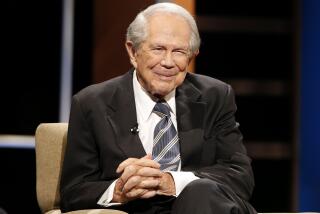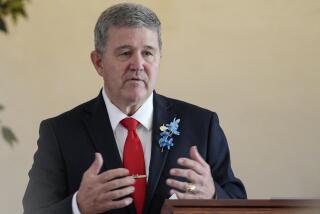Feud in Virginia Could Wipe Out State’s 2 Presidential Prospects : Politics: The brawl between Robb and Wilder could doom their careers and cripple the Democrats in 1992. A face-to-face meeting has been set.
- Share via
WASHINGTON — At the dawn of the 1992 presidential race, there was hope in Virginia that the state that used to be called “the mother of presidents” might revive its historic claim. The state’s two most powerful Democratic politicians--Gov. L. Douglas Wilder and Sen. Charles S. Robb--both were seen as possible candidates. But these days, the native-son hopes are fading fast in the billowing dust of a feud between the two men that includes secretly recorded tapes, a private investigator, a mysterious police investigation and a beauty queen.
The episode also will not do much for a Democratic Party struggling to get its presidential campaign under way.
“In my 41 years in politics, I’ve never seen this kind of brawl,” said John C. White, former chairman of the Democratic National Committee. Adds Larry J. Sabato, Virginia’s pre-eminent political pundit: “This can only add to the Democrats’ image as a party in disarray.”
The latest episode centers on a five-minute tape of then-Lt. Gov. Wilder talking on his car phone to the chairman of his campaign finance committee in 1988. On June 8, Robb acknowledged that his staff had possessed a copy of the tape for 2 1/2 years.
Authorities are still trying to find out who did the taping. But in the tape, which Robb said his staff destroyed last month, Wilder chortles over stories about Robb’s personal life and predicts that Robb is “finished” politically because of it. And Wilder discusses how he persuaded a reporter to write critical stories about Robb’s troubles.
Robb, who is the husband of President Lyndon B. Johnson’s daughter, Lynda Bird Johnson, has been dogged by long-lived rumors that he attended wild parties in Virginia Beach, Va., accompanied by single women while he was governor in the early 1980s. He was also rumored to have used drugs or to have been present while other party-goers did.
Robb, who has denied rumors of philandering and involvement with drugs, acknowledged last Thursday that “in hindsight” he should have immediately ordered destruction of the tape, which his staff said was delivered anonymously to his offices in a brown envelope. Robb said that he had committed no crime or breach of ethics.
“I have never claimed to be a rocket scientist, a great visionary, or a great musician,” said Robb, 52, who was a Marine during the Vietnam War and who won his first political office, the lieutenant governorship, largely on the strength of his war-hero record and celebrity as LBJ’s son-in-law. “My reputation for truthfulness and veracity is what has sustained me.”
Nonetheless, Robb temporarily suspended his chief of staff and two other aides, as Virginia Atty. Gen. Mary Sue Terry asked the FBI and the Virginia State Police to investigate the eavesdropping.
Wilder, meanwhile, has hammered away at the Robb camp for trying to embarrass him with leaked tapes, while insisting he has never feuded with Robb--or anyone else.
“Why am I so concerned about being a victim? Because for two years I have been subjected to eavesdropping and have no idea how many tapes were listened to, what was overheard,” the nation’s first elected black governor testily told reporters.
But Wilder has been drawing Democratic ire for his apparent determination to keep the strife alive. Even last week, while he was meeting with world leaders such as Polish President Lech Walesa on a trade trip to Europe, Wilder continued to make strong statements denouncing the Robb camp.
But on Saturday, Robb was quoted by the Washington Post as saying that he and Wilder had agreed to a private meeting Tuesday prior to a Capitol Hill reception for Virginia Democrats. It will be their first face-to-face meeting since the taping controversy began.
The Post said that state Democratic Chairman Paul Goldman, a chief Wilder confidant, negotiated terms for the meeting.
Robb said that he and Wilder spoke Friday night, their second conversation since the governor returned from his European trip last Wednesday, and had a “delightful” and “very cordial” exchange.
For Wilder, the feud has added to the damaging perception that, in fighting his way to the top, he has developed a bad habit of nurturing grudges.
For a Democratic Party faced with a tough presidential race, this painfully public dispute “won’t decide anything, . . . it just doesn’t look good,” said Sabato, who is a professor at the University of Virginia. Although President Bush’s approval rating has dropped from its postwar peak of over 90%, Bush remains a daunting opponent, and Democrats have so far appeared fractious and disunited as their candidates have edged toward the race.
Wilder’s presence in the race as a credible candidate could help invigorate the party’s black members, some analysts say. As a potential presidential or vice-presidential candidate, he could lend the ticket a centrist tone and ethnic and geographic balance. His absence could enable Jesse Jackson to win more delegates and, by strengthening Jackson’s role in the party, “would make the party look less mainstream,” says Doug Bailey, a former Republican political consultant who runs a political news service.
On a more practical level, the battle also gives some Democratic senators heartburn because of Robb’s position as chairman of the Democratic Senatorial Campaign Committee. The job is a high-profile position that involves soliciting contributions, planning senatorial campaign strategy and traveling the country.
White, the former Democratic Party chairman, believes that while both men’s careers may recover from the wounds in time, “for the short term, it’s like both of them have been machine-gunned.”
Sabato, the political scientist, is even more pessimistic. “Robb’s career is dead, and Wilder’s is in intensive care,” he said, adding: “Virginia, the mother of presidents, is no longer pregnant.”
Officially, Robb has counted himself out of the 1992 race, apparently looking toward the 1996 contest. Wilder has said that he is exploring a run next year. Some have speculated the two are best positioned in 1992 to become vice-presidential picks.
But the intensity of their feud--”like two scorpions in a bottle” in the words of one Democratic strategist--makes it very unlikely that they will be chosen as the second man on the ticket.
“You pick somebody for the vice presidency for loyalty--just like Bush picked Quayle,” said a Democratic congressman who asked to remain anonymous. “At the moment, neither of these men seems to have much of that.”
But if the men are to resurrect their national careers, they may need to explain further some actions that do not show them in the best light.
Some voters, for example, may not be persuaded by Robb’s explanation of why he did not turn over the tape to authorities. In his press conference last Thursday, he compared it to somebody who sees a speeding car and does not phone in the license number to the police.
“It didn’t seem important,” he said.
Some have also found fault with Robb’s handling of an episode of the NBC television show “Expose,” which on April 28 again aired charges that Robb had attended wild parties in Virginia Beach.
The show included an interview with a former Miss Virginia USA, Tai Collins, who said that she had an affair with Robb in 1984 and who produced a secret tape she had made of a conversation with David McCloud, the now-suspended Robb chief of staff.
In the tape, McCloud expressed annoyance with Billy A. Franklin, a private investigator once employed by Republicans and who recently has written a book about Robb’s alleged secret life. “If he wants to take on a U.S. senator,” McCloud said of Franklin, “he’s going to have problems with the IRS, all the way to the Justice Department. . . .”
Robb has denied he had an affair with Collins, though he acknowledged that he did drink a bottle of wine with her in a hotel room, where he said she gave him a massage. He has defended McCloud from charges that McCloud was threatening to sic the IRS on Franklin, saying the taped conversation showed only that McCloud seemed “fed up with somebody.”
Wilder has come in for criticism of a different sort. Many Virginians believe he improperly ordered a Virginia State Police investigation into threats against Collins and a land developer who also appeared on the NBC show. The investigation began May 17, then was mysteriously dropped after less than 24 hours with Wilder saying police “are not investigating anyone--period.”
Since 1982, when their feud become highly public, the two men have fought over a federal judicial appointment, the choice of the 1982 Democratic Senate candidate and the apportioning of credit for the Democrats’ 1985 sweep of top state offices.
Polls taken by one firm, Mason-Dixon Opinion Research, show that both men may be in trouble with the state’s voters.
On the issue of performance in office, Robb last January was rated “excellent” or “good” by 64% of Virginians. In a poll taken between April 30 and May 1, his rating had fallen to 52%.
On the same question, Wilder got a rating of 44% in January, 1991, but had slid to 34% in May.
If the scandal does not wipe out Robb’s career in Virginia, the culminating event in his feud with Wilder may come in 1994, when Robb runs for reelection. Since Virginia has a one-term limit for governors, Wilder may run against Robb.
There is still, of course, the chance that after years of squabbling, the two will finally find their disagreement too bizarre to continue. As the two prepared to meet this week, Robb seemed to be nearing that point.
“The thing has gotten so out of hand,” he said a few days ago. “It’s bewildering.”
Staff writer Beth Hawkins contributed to this story.
More to Read
Get the L.A. Times Politics newsletter
Deeply reported insights into legislation, politics and policy from Sacramento, Washington and beyond. In your inbox twice per week.
You may occasionally receive promotional content from the Los Angeles Times.











